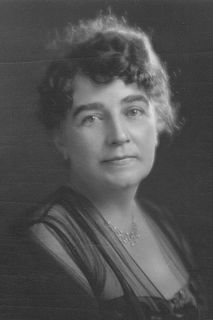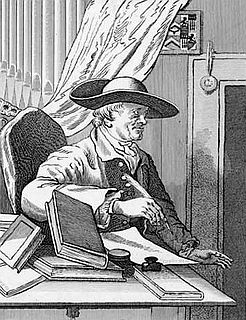A Quote by Thomas Browne
Thus there are two books from whence I collect my Divinity; besides that written one of God, another of his servant Nature, that universal and public Manuscript, that lies expans'd unto the eyes of all; those that never saw him in the one, have discovered him in the other.
Related Quotes
It is a fearful thing to hate whom God hath loved. To look upon another-his weaknesses, his sins, his faults, his defects is to look upon one who is suffering. He is suffering from negative passions, from the same sinful human corruption from which you yourself suffer. This is very important: do not look upon him with judgmental eyes of comparison, noting the sins you assume you'd never commit. Rather, see him as a fellow sufferer, a fellow human being who is in need of the very healing of which you are in need. Help him, love him, pray for him do unto him as you would have him do unto you.
The prevailing idea seems to be, that I come to God and ask Him for something that I want, and that I expect Him to give me that which I have asked. But this is a most dishonouring and degrading conception. The popular belief reduces God to a servant, our servant: doing our bidding, performing our pleasure, granting our desires. No, prayer is a coming to God, telling Him my need, committing my way unto the Lord, and leaving Him to deal with it as seemeth Him best.
Had He not emerged from the tomb all our hopes, all our salvation would be lying dead with Him unto this day. But as we see Him issue from the grave we see ourselves issue with Him in newness of life. Now we know that His shoulders were strong enough to bear the burden that was laid upon them, and that He is able to save to the uttermost all that come unto God through Him. The resurrection of Christ is thus the indispensable evidence of His completed work, His accomplished redemption.
Some would define a servant like this: 'A servant is one who finds out what his master wants him to do, and then he does it.' The human concept of a servant is that a servant goes to the master and says, 'Master, what do you want me to do?' The master tells him, and the servant goes off BY HIMSELF and does it. That is not the biblical concept of a servant of God. Being a servant of God is different from being a servant of a human master. A servant of a human master works FOR his master. God, however, works THROUGH His servants.
To my way of thinking and working, the greatest service a piece of fiction can do any reader is to leave him with a higher ideal of life than he had when he began. If in one small degree it shows him where he can be...gentler, saner, cleaner, kindlier...it is a wonder-working book. If it opens his eyes to one beauty in nature he never saw for himself and leads him one step toward the God of the Universe, it is a beneficial book.
'Go to My brethren, and say unto them, I ascend unto My Father, and your Father, and to My God, and your God' (Jn. 20:!7). He is our Father by grace through the Spirit of adoption (Rom. 8:15), but His Father by nature on account of His divinity. Similarly, He is our God as the creator of our human nature, but His God by reason of the dispensation whereby He became man. He made these distinctions so that we might understand the difference.
There are three infallible ways of pleasing an author, and the three form a rising scale of compliment: 1, to tell him you have read one of his books; 2, to tell him you have read all of his books; 3, to ask him to let you read the manuscript of his forthcoming book. No. 1 admits you to his respect; No. 2 admits you to his admiration; No. 3 carries you clear into his heart.
Our passions are the chief means of self-preservation; to try to destroy them is therefore as absurd as it is useless; this would be to overcome nature, to reshape God's handiwork. If God bade man annihilate the passions he has given him, God would bid him be and not be; He would contradict himself. He has never given such a foolish commandment, there is nothing like it written on the heart of man, and what God will have a man do, He does not leave to the words of another man. He speaks Himself; His words are written in the secret heart.
It was a fatal day when the public discovered that the pen is mightier than the paving-stone, and can be made as offensive as the brickbat. They at once sought for the journalist, found him, developed him, and made him their industrious and well-paid servant. It is greatly to be regretted, for both their sakes.
And just as He appeared before the holy Apostles in true flesh, so now He has us see Him in the Sacred Bread. Looking at Him with the eyes of their flesh, they saw only His Flesh, but regarding Him with the eyes of the spirit, they believed that He was God. In like manner, as we see bread and wine with our bodily eyes, let us see and believe firmly that it is His Most Holy Body and Blood, True and Living.For in this way our Lord is ever present among those who believe in him, according to what He said: "Behold, I am with you all days even to the consummation of the world."





































